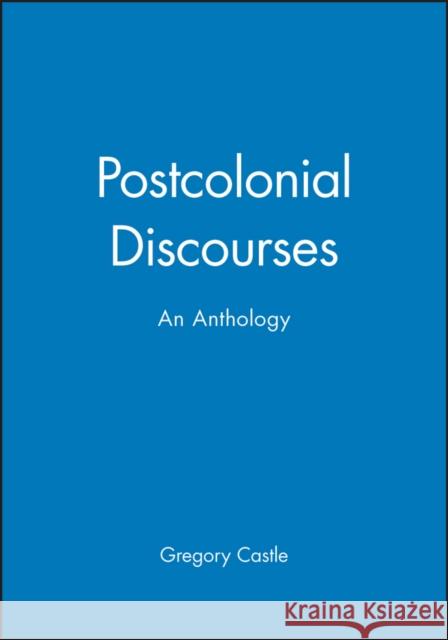Postcolonial Discourses: An Anthology » książka



Postcolonial Discourses: An Anthology
ISBN-13: 9780631210047 / Angielski / Twarda / 2001 / 552 str.
Postcolonial Discourses: An Anthology
ISBN-13: 9780631210047 / Angielski / Twarda / 2001 / 552 str.
(netto: 655,02 VAT: 5%)
Najniższa cena z 30 dni: 682,14
ok. 30 dni roboczych.
Darmowa dostawa!
Emphasising the increasingly regional or national approach to the legacies of colonialism, this Reader provides an entirely new way for students to engage with an important and complex area of discourse.
Glosariusz/słownik
"Gregory Castle has assembled a rich collection of key texts which will succeed in introducing postcolonialism to newcomers (above all students) while at the same time provide a useful store of critical materials for those further into the field (above all lecturers, researchers and scholars). This is a well–gathered collection, representing significant writing over the last 20 or so years, and demonstrating excellent research and a sure knowledge of the field in its choice and arrangement of material. This is a work with a first–rate set of ideas and references. The hardback is an excellent addition to the library shelf and the paperback a must for personal reading, particularly for serious students of the subject." Reference Reviews
Thematic Contents.
Acknowledgments.
Editor s Introduction: Resistance and Complicity in Postcolonial Studies.
Selected Bibliography..
Part I: Post–Colonial Discourses: Complicity and Critique.
"Spontaneity: Its Strength and Weakness" (Frantz Fanon).
"Discrepant Experiences" (Edward W Said).
"Unsatisfied: Notes on Vernacular Cosmopolitanism" (Homi K Bhabha).
"The Burden of English" (Gayatri Chakravorty Spivak).
"Colonialism and Desiring Machines" (Robert Young).
"Post–Colonial Critical Theories" (Stephen Slemon).
Part II: Indian Nations: The Conundrum of Difference.
"The Prose of Counter–Insurgency" (Ranajit Guha).
"The Nationalist Resolution of the Women′s Question" (Partha Chatterjee).
"Representing Sati: Continuities and Discontinuities" (Rajeswari Sunder Rajan).
"Nationalism, Gender, and the Narrative of Identity" (R Radhakrishnan).
Part III: African Identities: Resistance and Race.
"An Image of Africa: Racism in Conrad′s Heart of Darkness" (Chinua Achebe).
"African Identities" (Kwame Anthony Appiah).
"Unsystematic Fingers at the Conditions of Times′: ′Afropop′ and the Paradoxes of Imperialism" (Neil Lazarus).
"Sheroes and Villains: Conceptualizing Colonial and Contemporary Violence Against Women in Africa" (Amina Mana).
Part IV: Caribbean Encounters: Revolution, Hybridity, Diaspora.
"Colonialism and the Caribbean Novel" (George Lamming).
"Negotiating Caribbean Identities" (Stuart Hall).
"Survival and Invention: Indigeneity in the Caribbean" (Peter Hulme).
"Sending the Younger Son Across the Wide Sargasso Sea: The New Colonizer Arrives" (Moira Ferguson).
Part V: Rump Commonwealth: Settler Colonies and the "Second World".
"Crimes and Punishments" (Bob Hodge and Vijay Mishra).
"Colonizing Gender in Colonial Australia: The Eliza Fraser Story" (Kay Schafer).
"The Body in the Library: Identity, Opposition, and the Settler–Invader Woman" (Helen Tiffin).
"Out of the Center: Thoughts on the Post–Colonial Literatures of Australia and New Zealand" (Ralph J Crane).
Part VI: The Case of Ireland: Inventing Nations.
"Adulteration and the Nation" (David Lloyd).
"Reading in a Woman′s Death: Colonial Text and Oral Tradition in Nineteenth–Century Ireland" (Angela Bourke).
"Deanglicization" (Declan Kiberd).
"Race Against Time: Racial Discourse and Irish History" (Luke Gibbons).
Glossary.
Index.
Gregory Castle teaches English and Irish literature at Arizona State University. He is the author of Modernism and the Celtic Revival (Cambridge University Press, 2001) as well as numerous essays in Irish studies and postcolonialism.
This ground–breaking collection of postcolonial discourses takes a region–by–region approach to postcolonial theory, giving a sense of the heterogeneity of postcolonial studies.
The development of postcolonial studies is inextricably tied to specific geographical, social, and historical conditions. Gregory Castle′s regional approach emphasizes the separate development of different theories, but also enables students to compare different colonial problems and the various postcolonial theoretical solutions that have evolved in different regions.
In order to give students a fuller sense of the themes and issues specific to different regions, the anthology includes essays in their entirety. An introductory section includes recent essays by seminal thinkers like Homi K. Bhabha, Gayatri Chakravorty Spivak, and Edward Said. Five sections follow that give coverage to post–colonial thought in South Asia, the Caribbean, Africa, Australia and New Zealand, and Ireland. In each of these sections, issues central to the development of postcolonial thought and its relation to colonial discourse are featured in essays by some of the most important scholars writing today.
A general introduction provides the student with an overview of the issues covered in the anthology, detailing how different regions respond to the British Empire and its legacy in the post–colonial world. Though these responses spring from different kinds of problems, they are directed toward the same source of power. The continuities between and among these responses, which are detailed in headnotes for each entry, justify the existence of the so–called "postcolonial moment".
1997-2026 DolnySlask.com Agencja Internetowa
KrainaKsiazek.PL - Księgarnia Internetowa









